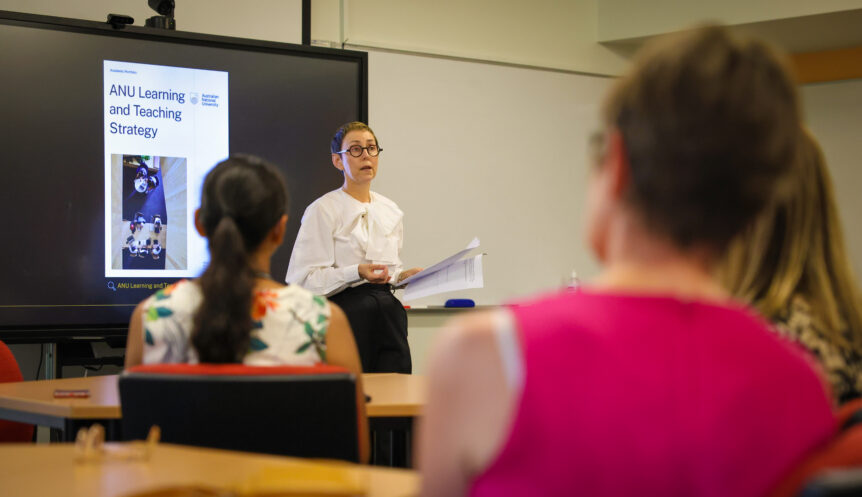First year is where our students learn to learn, and where they establish the expectations of learning at university that will shape how they engage with us in subsequent years. That’s why so many of our conversations are circling back to how critical it is that we get first year right.
At a time when many of our current students want more flexibility and more online or hybrid options, and when many new school-leavers are veterans of long stretches of remote learning, we need to think carefully about the kinds of learning experiences that will bring students into our classrooms and keep them coming back.
Our first year classrooms need to be dynamic and challenging. If you have had a chance to look at the new ANU Learning and Teaching Strategy, it outlines our plans for active and authentic learning experiences that underscore for students the importance of presence or ‘being there’.
Sally Kift has long emphasised that “first-year students arrive with very different academic and social skills, and from different backgrounds and cultures. Many are also making big life adjustments: for example, by living away from home for the first time”, and by being separated from their familiar support networks. Those adjustments are particularly real for our students here at ANU, the vast majority of whom relocate in order to take up their studies with us.
Only a portion of our students attend orientation activities. That places even more responsibility on our first year lecturers and tutors to support students in making successful transitions to university life and learning. The first year classroom is where they will do the work of adjusting, networking, engaging and testing – perhaps failing at times, but always learning. It will define their initial university experiences. We need to make these the best experiences we can, as so much rides on it for our students.

In class factors impact student experience the most
We recently had access to analysis of combined G08 Student Experience Survey data that sought to isolate key factors that influence student experience – and consequently student survey responses on that experience. It probably won’t surprise anyone that this analysis showed that in-classroom factors are the most impactful on the student experience, including:
- the attitudes of teaching staff attitudes towards their students
- the degree to which teaching staff are prepared to support and provide feedback to students, and
- the time teaching staff invest in listening to student concerns.
Imagine how much more critical these elements are during first year, when students have practical questions about studying at ANU, as they seek to understand our expectations of them and encounter new knowledge, and when they’ve entered a realm of learning predicated on high degrees of independence and self-management.
Introducing the Teaching First Year Good Practice Guide
Our new Teaching First Year Good Practice Guide has arrived at the right moment for us here at ANU. The guide builds from a strong evidence base of what works. It is impressively clear and simple. It’s also realistic about the tensions we all feel between wanting to do better and struggling to find the time to make changes.
With this in mind, the guide takes different elements (transition, diversity, engagement, for example) and provides both easy actions that anyone can incorporate right now in week one and across this semester, as well as longer term design work that can embed sustainable change but might take a little more effort and commitment to realise.
It’s a very good example of how the Centre for Learning and Teaching (CLT) is committing to support strategic work around learning and teaching, curriculum and student experience; to provide practical support for our academic staff; and, to be responsive to areas of high priority and high need.

February 2023
Acknowledgements: This guide was developed by the Centre for Learning and Teaching (CLT) team in partnership with the Student Success and Engagement team, with the leadership of Dr Lucy Neave as Chair of the Orientation and Transition Working Group.
Professor Maryanne Dever is the ANU Pro Vice-Chancellor (Education & Digital)

